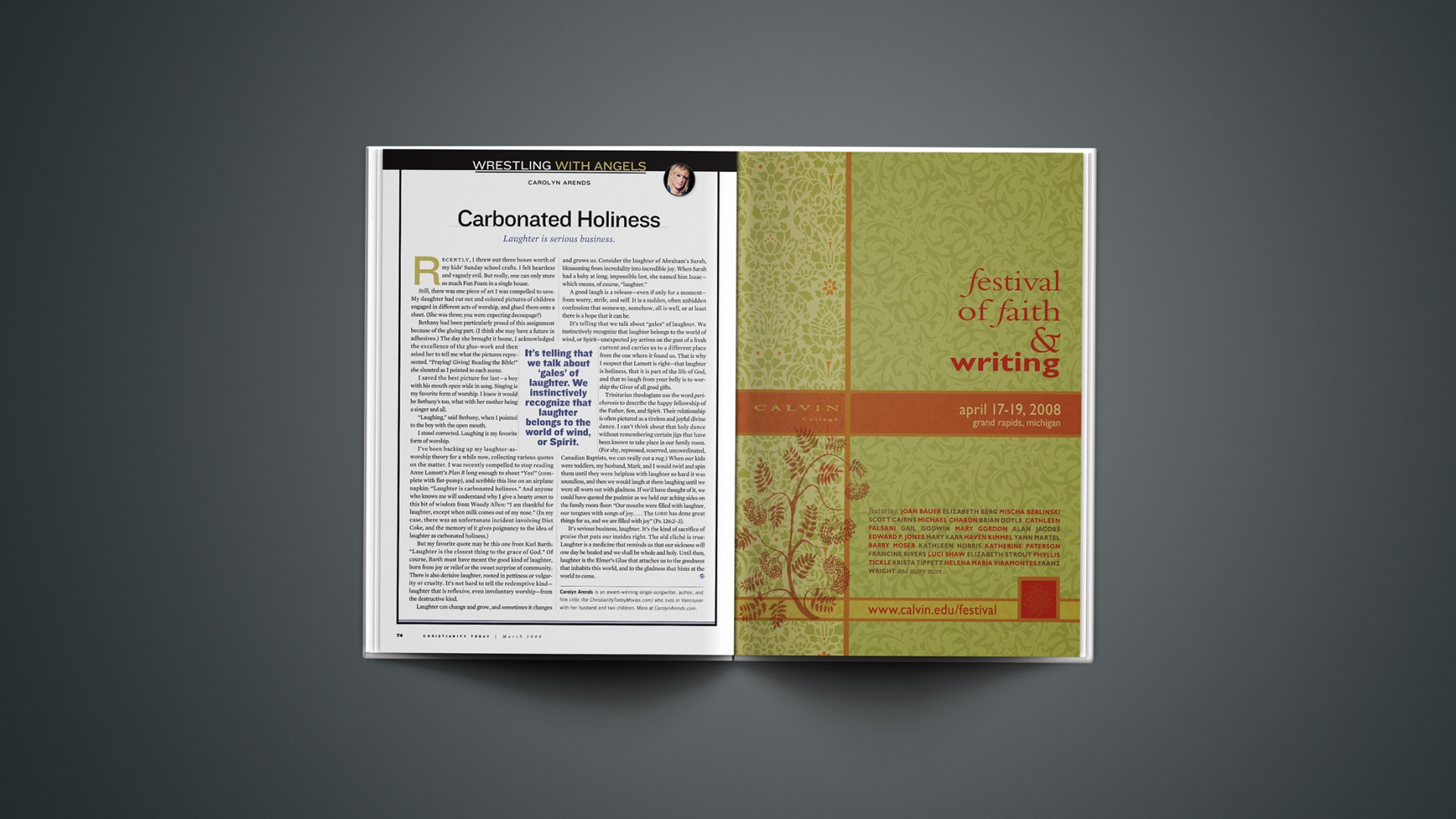Recently, I threw out three boxes worth of my kids’ Sunday school crafts. I felt heartless and vaguely evil. But really, one can only store so much Fun Foam in a single house.
Still, there was one piece of art I was compelled to save. My daughter had cut out and colored pictures of children engaged in different acts of worship, and glued them onto a sheet. (She was three; you were expecting decoupage?)
Bethany had been particularly proud of this assignment because of the gluing part. (I think she may have a future in adhesives.) The day she brought it home, I acknowledged the excellence of the glue-work and then asked her to tell me what the pictures represented. “Praying! Giving! Reading the Bible!” she shouted as I pointed to each scene.
I saved the best picture for last—a boy with his mouth open wide in song. Singing is my favorite form of worship. I knew it would be Bethany’s too, what with her mother being a singer and all.
“Laughing,” said Bethany, when I pointed to the boy with the open mouth.
I stood corrected. Laughing is my favorite form of worship.
I’ve been backing up my laughter-as-worship theory for a while now, collecting various quotes on the matter. I was recently compelled to stop reading Anne Lamott’s Plan B long enough to shout “Yes!” (complete with fist-pump), and scribble this line on an airplane napkin: “Laughter is carbonated holiness.” And anyone who knows me will understand why I give a hearty amen to this bit of wisdom from Woody Allen: “I am thankful for laughter, except when milk comes out of my nose.” (In my case, there was an unfortunate incident involving Diet Coke, and the memory of it gives poignancy to the idea of laughter as carbonated holiness.)
But my favorite quote may be this one from Karl Barth: “Laughter is the closest thing to the grace of God.” Of course, Barth must have meant the good kind of laughter, born from joy or relief or the sweet surprise of community. There is also derisive laughter, rooted in pettiness or vulgarity or cruelty. It’s not hard to tell the redemptive kind—laughter that is reflexive, even involuntary worship—from the destructive kind.
Laughter can change and grow, and sometimes it changes and grows us. Consider the laughter of Abraham’s Sarah, blossoming from incredulity into incredible joy. When Sarah had a baby at long, impossible last, she named him Isaac—which means, of course, “laughter.”
A good laugh is a release—even if only for a moment—from worry, strife, and self. It is a sudden, often unbidden confession that someway, somehow, all is well, or at least there is a hope that it can be.
It’s telling that we talk about “gales” of laughter. We instinctively recognize that laughter belongs to the world of wind, or Spirit—unexpected joy arrives on the gust of a fresh current and carries us to a different place from the one where it found us. That is why I suspect that Lamott is right—that laughter is holiness, that it is part of the life of God, and that to laugh from your belly is to worship the Giver of all good gifts.
Trinitarian theologians use the word perichoresis to describe the happy fellowship of the Father, Son, and Spirit. Their relationship is often pictured as a tireless and joyful divine dance. I can’t think about that holy dance without remembering certain jigs that have been known to take place in our family room. (For shy, repressed, reserved, uncoordinated, Canadian Baptists, we can really cut a rug.) When our kids were toddlers, my husband, Mark, and I would twirl and spin them until they were helpless with laughter so hard it was soundless, and then we would laugh at them laughing until we were all worn out with gladness. If we’d have thought of it, we could have quoted the psalmist as we held our aching sides on the family room floor: “Our mouths were filled with laughter, our tongues with songs of joy. … The LORD has done great things for us, and we are filled with joy” (Ps. 126:2–3).
It’s serious business, laughter. It’s the kind of sacrifice of praise that puts our insides right. The old cliché is true: Laughter is a medicine that reminds us that our sickness will one day be healed and we shall be whole and holy. Until then, laughter is the Elmer’s Glue that attaches us to the goodness that inhabits this world, and to the gladness that hints at the world to come.
Carolyn Arends is an award-winning singer-songwriter, author, and film critic (for ChristianityTodayMovies.com) who lives in Vancouver with her husband and two children. More at CarolynArends.com.
Copyright © 2008 Christianity Today. Click for reprint information.
Related Elsewhere:
Other articles on spirituality and prayer are available on our site.










